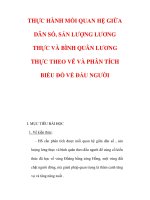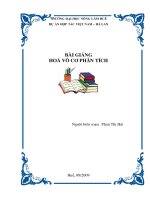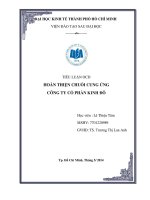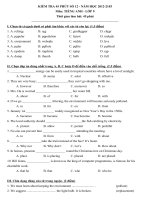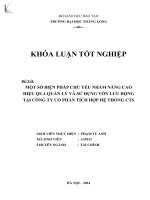CHUỖI IELTS SPEAKING THEO TOPIC có PHÂN TÍCH TOPIC 3
Bạn đang xem bản rút gọn của tài liệu. Xem và tải ngay bản đầy đủ của tài liệu tại đây (67.37 KB, 4 trang )
CHUỖI IELTS SPEAKING THEO TOPIC
CÓ PHÂN TÍCH
(Group: IELTS Fighter hỗ trợ học tập)
TOPIC 3: READING
PART 2
Describe a book that you enjoyed reading because you had to think a lot.
You should say:
What this book was
Why you decided to read it
What reading this book made you think about
And explain why you enjoyed reading this book
I’ve chosen The Golden Compass, the first book in a fantasy trilogy written by Philip
Pullman. It’s a piece of literature that covers a multitude of fantastical elements, from
magic to religion to creatures of myth.
It’s a very complex book, actually. At the very first glance, it could seem like a
children’s book with the common standard of saving the innocent from the big great
evil, which is what originally drew my attention to it. But there are levels to this story
and its development that only mature readers are able to pick up. I found particularly
interesting parallels drawn between the dogma of this world and our own and that
was very appealing to me as I have always been a student of religions around the
world.
It made me reflect on my personal beliefs and the history of the Catholic church
mainly. The author’s storytelling is captivating, he weaves a world with his words that
seemed driven by a simple reason, which is to save people, and he ends up making
the characters question religion and its the powers that can be the morality of the
greater good.
I loved this book as it kept me on my toes at every turn and it used real life
counterparts for places on our world, which made it more appealing by adding to the
sensation of reality within fantasy. That was so strong that when I visited England I
took the chance to visit several of the locations described in the book.
Vocabulary
Phonetic
Meaning
trilogy
/ˈtrɪlədʒi/
bô ba (truyện)
literature
/ˈlɪt(ə)rətʃə/
văn học
level
/ˈlɛv(ə)l/
tầng lớp (nghĩa)
mature
/məˈtʃʊə/
trưởng thành
parallel
/ˈparəlɛl/
song song
reflect on
/rɪˈflɛkt ɒn/
nhìn lại, ngẫm lại
storytelling
/ˈstɔːrɪtɛlɪŋ/
lối kể chuyện
weave
/wiːv/
dệt
the greater good
/ðə ɡreɪtə ɡʊd/
những mục đích cao cả
keep on one’s toes
/kiːp ɒn təʊz/
khiến tôi hào hứng
sensation
/sɛnˈseɪʃ(ə)n/
sự hồi hộp, sự hấp dẫn
PART 3
1. What are the most popular types of children’s books in your country?
I would say it’s a toss-up between fantasy and reality fiction. Fantasy is a genre filled
with stories that are full of impossible things that could not take place in reality, such
as magic and talking animals, often set in a different world or universe. This genre
actively develops the reader’s imagination through it’s worldbuilding. Reality fiction,
on the other hand, is firmly rooted in reality so requires less of an active connection
to the imagination. The stories are still fictitious, but they could happen to anyone as
the plots deal with events such as falling in love, work, and addiction, for example.
2. What are the benefits of parents reading books to their children?
I think the benefits have been well documented, research has shown that reading to
a child can be highly beneficial to his development. They will have a chance to learn
new vocabulary, practice their pronunciation, improve their listening skills and
develop their creativity and imagination, this should have a lasting impact on their
intelligence. In addition, it is also a valuable social interaction between parents and
children that can be used as a bonding opportunity.
3. Should parents always let their children choose the books they read?
I think it is a great motivational tool that could in fact make them better readers. I am
an avid reader, but I still remember how much I hated being assigned books at
school that I had no interest in. I also understand the concern that a parent might
have about their children reading the “wrong thing” or choosing something out of
their ability, so I would think that a good middle ground would be for a parent to
present choices to children. Tailor the experience to their needs and make them feel
that their opinion matters in the choice.
4. How popular are electronic books in your country?
I think the popularity of the format has skyrocketed in the the past 10 years. It was
met at the beginning with a lot of hesitation, particularly from the book industry which
saw the advance as a threat, but overall the readers have taken to the change with a
positive attitude. At the end of the day, the average reader is concerned mainly with
how good a story is and how much it fuels the imagination. That e-books becoming
more affordable has also helped push the popularity of the format and made it more
accessible to people.
5. What are the advantages of parents reading electronic books (compared to
printed books)?
There are a number of things to consider, off the top of my head, I can think of 3:
cost, accessibility and space. Since there is no physical copy of the book, e-books
will generally be priced lower than their physical counterpart. If you are a parent
looking to stretch your wallet as far as it will go, this seems like a valid point to
consider. That is followed by how accessible they are. I could, in this instant, search
for a book on my device, buy it and have it delivered instantly to the palm of my hand
without ever having to get up. And finally space, most modern e-readers are about
the size and weight of a paperback book and they can carry more than 1000 books.
6. Will electronic books ever completely replace printed books in the future?
I think e-books have created new experiences for readers, but will never entirely
replace print. For a reader, the interaction with a book is part of the experience, a
physical copy holds more than just a story, it’s a record of the reader’s interaction
with it. Dog ears, bookmarks, notes, highlighting, stains, they all shape the book just
as a child grows, and that is something that is irreplaceable. That means that while
the e-books might be a marvel of technology and advancement, it can’t entirely
replace what came before it but in many ways have a symbiotic relationship where
the success of one fuels the other and that is great for now.
Vocabulary
Phonetic
Meaning
toss-up
/tɒs ʌp/
hai lựa chọn ngang bằng
(không thể chọn một trong
hai)
fantasy
/ˈfantəsi/
truyện giả tưởng
reality fiction
/rɪˈalɪti /ˈfɪkʃ(ə)n/
tiểu thuyết thực tế
genre
/ˈʒɒɒ̃rə/
thể loại
/wəːld ˈbɪldɪŋ/
worldbuilding
tạo nên một thế giới trong
truyện
root in
/ruːt ɪn/
xuất phát từ
fictitious
/fɪkˈtɪʃəs/
hư cấu
lasting
/ˈlɑːstɪŋ/
còn mãi
intelligence
/ɪnˈtɛlɪdʒ(ə)ns/
trí tuệ
bonding
/ˈbɒndɪŋ/
thắt chặt mối quan hệ với
nhau
motivational tool
/məʊtɪˈveɪʃ(ə)n(ə)l tuːl/
công cụ tạo động lực
avid
/ˈavɪd/
(hâm mộ) cuồng nhiệt
assign
/əˈsʌɪn/
chỉ định
middle ground
/ˈmɪd(ə)l ɡraʊnd/
ở mức giữa/trung bình
tailor
/ˈteɪlə/
thêu dệt lên
matter
/ˈmatə/
(có ý nghĩa) quan trọng
skyrocket
/ˈskʌɪrɒkɪt/
tăng vụt lên
hesitation
/hɛzɪˈteɪʃn/
sự lưỡng lự
fuel
/fjuː(ə)l/
tạo nên, kích thích
physical
/ˈfɪzɪk(ə)l/
(bản) cứng
counterpart
/ˈkaʊntəpɑːt/
(những đối tượng) tương
tự
stretch
/strɛtʃ/
(về tiền bạc) tiết kiệm
valid
/ˈvalɪd/
hợp lý
paperback
/ˈpeɪpəbak/
(bản) bìa mềm
record
/ˈrɛkɔːd
sự ghi/thu lại
irreplaceable
/ɪrɪˈpleɪsəb(ə)l/
không thể thay thế
marvel
/ˈmɑːv(ə)l/
sự kỳ diệu

